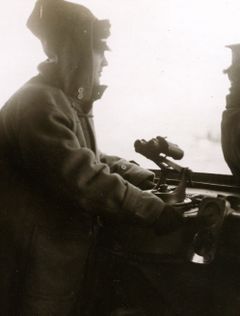Difference between revisions of "Mechanical Aid-to-Spotter"
From The Dreadnought Project
Jump to navigationJump to search| Line 1: | Line 1: | ||
| − | [[File:MysteryDeviceInBritishSpottingTop.jpg|thumb| | + | [[File:MysteryDeviceInBritishSpottingTop.jpg|thumb|240px|'''Kilroy's Mechanical Aid-to-Spotter'''<br>This may be such a device, or an Evershed transmitter.]] |
The '''Mechanical Aid-to-Spotter''' was designed by {{LieutRN}} [[Willie Dickson Kilroy|W. D. Kilroy]] to ensure that the [[Spotting Officer|spotting officer]] was watching the same target as was being fired upon by his own ship. | The '''Mechanical Aid-to-Spotter''' was designed by {{LieutRN}} [[Willie Dickson Kilroy|W. D. Kilroy]] to ensure that the [[Spotting Officer|spotting officer]] was watching the same target as was being fired upon by his own ship. | ||
| Line 12: | Line 12: | ||
This model was designed for use in light cruisers, and supply commenced in June, 1918.<ref>''The Technical History and Index: Fire Control in HM Ships, 1919'', pp. 26.</ref> | This model was designed for use in light cruisers, and supply commenced in June, 1918.<ref>''The Technical History and Index: Fire Control in HM Ships, 1919'', pp. 26.</ref> | ||
| − | By 1919, it was supplied to the | + | By 1919, it was supplied to the [[Hawkins Class Cruiser (1917)|''Hawkins'']], [[Capetown Class Cruiser (1918)|''Capetown'']], [[Caledon Class Cruiser (1916)|''Caledon'']], [[Danae Class Cruiser (1917)|''Danae'']], [[Centaur Class Cruiser (1916)|''Centaur'']] and [[Birmingham Class Cruiser (1913)|''Birmingham'']] classes, with plans to eventually fit it in |
| − | + | [[Chatham Class Cruiser (1911)|''Chatham'']], [[Weymouth Class Cruiser (1910)|''Weymouth'']], [[Cambrian Class Cruiser (1915)|''Cambrian'']], [[Caroline Class Cruiser (1914)|''Caroline'']], [[Arethusa Class Cruiser (1913)|''Arethusa'']], | |
| − | + | [[H.M.S. Furious (1916)|H.M.S. ''Furious'']], [[H.M.S. Eagle (1918)|''Eagle'']] and ''Hermes'' (Diomede and Despatch?)<ref> TODO: check distinctions in the Danae units mentioned.</ref>. | |
| − | + | {{TBCTONE}} | |
| − | |||
| − | |||
| − | |||
| − | |||
| − | with plans to eventually fit it in | ||
| − | |||
| − | |||
| − | |||
| − | |||
| − | |||
| − | |||
| − | |||
| − | |||
| − | |||
| − | |||
| − | {{ | ||
==See Also== | ==See Also== | ||
*[[Spotting]] | *[[Spotting]] | ||
| − | *[[Evershed | + | *[[Evershed Bearing Indicator]] |
==Footnotes== | ==Footnotes== | ||
Revision as of 01:11, 17 June 2011
The Mechanical Aid-to-Spotter was designed by Lieutenant W. D. Kilroy to ensure that the spotting officer was watching the same target as was being fired upon by his own ship.
Mark I
The need for this was envisioned in early 1916. It seems likely that supply commenced in late 1916 at the earliest.[1]
Mark II
Supply of these to the latest capital ships commenced in the early months of 1919.[2]
Mark II*
This model was designed for use in light cruisers, and supply commenced in June, 1918.[3]
By 1919, it was supplied to the Hawkins, Capetown, Caledon, Danae, Centaur and Birmingham classes, with plans to eventually fit it in Chatham, Weymouth, Cambrian, Caroline, Arethusa, H.M.S. Furious, Eagle and Hermes (Diomede and Despatch?)[4]. [TO BE CONTINUED - TONE]
See Also
Footnotes
Bibliography
- Template:BibUKFireControlInHMShips1919
- Handbook for this device (not read by me) C.B. 1285
